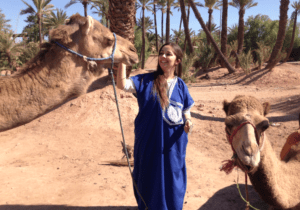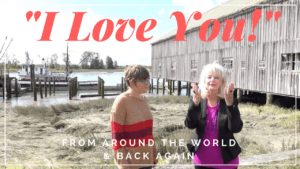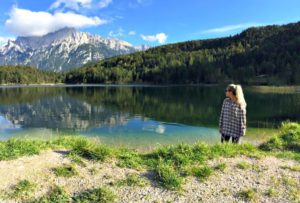There are many reasons we travel. Some of us want to experience a culture different from our own, try a local cuisine, hear new music, listen to another language. Some seek adventure. Wanting to explore nature, feel adrenaline, feel something new. And some seek connection like discovering an ancestral home, finding a home away from home, or finding home in another person. All of these things bring different rewards and experiences that contribute to our intelligence and understanding of the world, so it comes as no great surprise that with all this discovery comes personal growth.


We’ve all heard the spiel: “I’m travelling to find myself.” Or as our parents hear it, “I need an excuse to travel, listen to me talk like Gandhi.” As much mockery as this cliche’d sentiment receives, it’s a cliche for a reason. Finding ourselves is important to us. It’s something we all crave. Why do we do what we do? What do we stand for? Who are we? Traveling to an exotic or foreign location is definitely the nicest way to find these answers, but what do you do when the person you find isn’t the person you are?
I thought I knew who I was. An easy going, lazy girl, who loved reading and would find any excuse to leave the bar early to get a pizza. Ask any of my Canadian friends, getting me to go out could be like pulling teeth, but after a semester abroad and backpacking two continents, I discovered someone else: I became a girl with a passion for hiking, a curiosity for history and someone who actually wanted to go out and meet new people. I became someone who was thirsty for life and new experiences. After talking to some other travellers I discovered this wasn’t uncommon. To some degree or another, everyone becomes a different or better version of themselves due to traveling.


Now, I’m not saying these two selves are mutually exclusive. We don’t all have split personalities. Of course I’m more interested in history when exploring an ancient city. Of course I want to meet new people when surrounded by travellers from around the world (with hot as hell accents). The circumstances while travelling enhance and bring out aspects of myself that, unfortunately, become dormant while living at home. A study that examined how extended travel influenced personality development, showed that students who studied abroad had an increase in openness to experience, agreeableness and emotional stability. So the question I’m left wondering isn’t why we become different people while travelling, but how do we bring those people home? And subsequently, should we?

If being your “Travel Self” is being yourself to your fullest potential, isn’t it unreasonable to expect us to be at our best selves all the time? Being that “on” all of the time would become draining fairly quickly (unless you’re refuelling with alcohol, in which case let’s hang out) and is not a sustainable lifestyle. We need down time. Even for myself, an extreme extrovert, my energy comes from other people and social interaction. While being alone actually drains me, I still need down time. To someone like me down time means doing something relaxing with other people, like reading while they cook a meal (this is proven to upset others, I would not recommend it, unless are you are comfortable with being yelled at).

So I guess that leaves us with this question: How much of our Travel Selves can we reasonably bring home? Here are two traits from my Travel Self that I have attempted to bring home, and tips on how I’ve done it.
Consideration
While staying at the only hostel in Inle Lake, Myanmar, I witnessed how truly welcoming and kind the Myanmese people are. After a day of hiking, which the hostel employees had organized, they asked about our excursion and how our friend, who hadn’t been feeling well, was doing. This may not sound like a big deal, but when you consider that they have at least fifty other guests, the fact that they remembered exactly what we were doing and genuinely cared if we had a good time and for the welfare of our friend is pretty damn thoughtful. And it was contagious. Interacting with people who are always smiling and happy to see you, you suddenly become that person, smiling at everyone and eager for conversation.

Coming home, I wanted to translate this into my relationship with my parents. My parents can say one sentence to me and immediately all my maturity and emotional intelligence abandons me, only to return when my sister coaxes it back out. Our parents have that effect on us; it’s easy to lose our tempers with people who love us unconditionally. But I’d like to think that if I can be considerate with strangers, I can be considerate with family. So what I’ve been doing is asking myself two questions:
- Is this how I would react to someone else?
- What is the result of my reaction going to be?
Now, sometimes this works, and sometimes it fails spectacularly. On this front, I am a work in progress.
Engagement
Meeting new people is one of the main reasons I love traveling. I came to this realization when I was in Ao Nang, Thailand; I was talking to a guy from England and it came up that he used to be a professional breakdancer. I was fascinated by his life story and hearing about the training, the battles, and learning all about the breakdance world. Afterwords, I wondered why I was in such a good mood. It wasn’t that I had discovered a love of breakdancing and it wasn’t that I had found a romantic interest (although his eye lashes were ridiculously long), but it was the simple joy of getting to know someone. I had completely undervalued the impact that connecting with another person has.

Translating that motivation to engage with people at home is easier said than done. Making friends is hard and generally puts us out of our comfort zone, and being home is like being in one big comfort zone. Everything is familiar. One way I’ve found to continue engaging with people is simply by inclusion. By that, I mean always welcoming and including whoever you can. Invite everyone to your party. People change, maybe you’ll connect with an old friend or acquaintance. If a friend has someone visiting go say hello or invite them over. Include everyone you can and let your social circle grow. Another thing I like to do is say “yes” (see Becoming a Female Adventurer). By saying “yes” to opportunities that come your way you open yourself up to so many new experiences and people.

I would love to hear about other people’s Travel Selves and your tips or tricks on how you bring them home! Or, alternatively, why you’ve decided to keep them away (fingers crossed your Travel Self doesn’t have a problem with the law… but if so, please do share).



While living in Italy, I made a rule that I would never say no to a social invitation (dates were the allowed exceptions, ha!), and I continue that back home too. I’ve never regretted it, as tired as I may have been.
I totally agree/have experienced most of what you’ve written about. Great post!
Hey Peggy, i LOVE that rule and couldn’t agree more on the exception haha.
Thanks for reading!
Really enjoyed your post. Meeting other people is definitely one of the best things you can do while traveling. I always find it interesting to listen to both locals and foreigners. It’s amazing how they both give you unique perspectives regarding that country’s people, culture and how it feels to live there. While abroad, I always found it useful to make some new friends through meetups, something that I continue doing even when back home.
Hey Daniel,
Joining meet up’s is an awesome/ easy way to meet people- that’s a good one!
Really enjoyed your post. Meeting other people is definitely one of the best things you can do while traveling. I always find it interesting to listen to both locals and foreigners.
Definitely, meeting locals is always a highlight for me as well!
That the joy of travelling, meeting other people and spending time with them!
Really enjoyed your reflections on travel and self-discovery—it’s inspiring how journeys can shape perspective and confidence.
Thanks for the thoughtful travel insights!